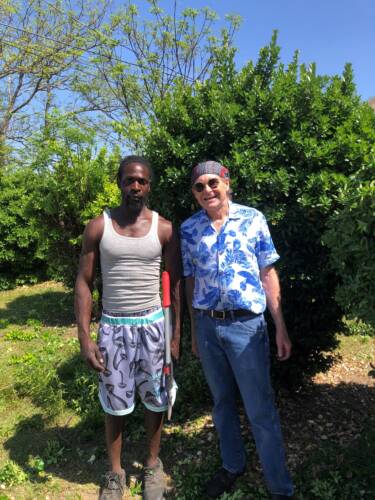
‘Taking Action’ Against Structural Racism
When God promised to be present through life’s floods and fires, the assurance was of little comfort to Trell, whose house burned to the ground. To make matters worse, his car, where he sought refuge, had a flat tire. That was when a local pastor made God’s presence real to him.
Pastor Steve Herring, who in retirement serves two small Presbyterian churches in Scotland Neck and Tarboro, North Carolina, also runs a junk removal and property cleanout business in Tarboro with his wife and son. He was uniquely positioned to help Trell by lending him a portable air compressor.
 Although Trell’s circumstances were caused by fire, many in Tarboro and neighboring communities such as Princeville have lost their homes and livelihoods because of climate change. Princeville, whose unique history has been all but wiped off the map, is the oldest U.S. town founded and settled by free African Americans.
Although Trell’s circumstances were caused by fire, many in Tarboro and neighboring communities such as Princeville have lost their homes and livelihoods because of climate change. Princeville, whose unique history has been all but wiped off the map, is the oldest U.S. town founded and settled by free African Americans.
Pastor Steve’s ongoing work in Princeville has mainly been to deconstruct and extract resources from its flood-damaged properties and reconstruct them to show — and save — the town’s heritage.
Preserving Princeville’s history has become more challenging since its residents, already marginalized due to the dual impact of structural racism and systemic poverty, have been steadily migrating outward in the wake of the destruction caused by several hurricanes.
Pastor Steve’s call to be a peacemaker includes pursuing pathways of peace by working to address structural racism and mitigating the catastrophic effects of climate change in his home. This work is made possible, in part, by gifts to the Peace & Global Witness Offering, traditionally received on World Communion Sunday, which this year falls on Oct. 1.
The Offering is unique in that 50% of receipts are directed to peacemaking and global witness efforts at the national church level to address peacemaking issues around the world. Twenty-five percent is retained by congregations for local peace and reconciliation work, and 25% goes to mid councils for similar ministries on the regional level.
The intersection of several of the most pressing challenges for peacemakers, namely poverty, racism, climate change, immigration and migration, are also among the primary concerns of being a Matthew 25 Church.
Pastor Steve says that the Church is called to do more than just believe. He shares with us the core of what he feels he has uncovered in the New Testament: “It’s about doing. It’s about making a switch to action. It’s about pragmatic, practical problem solving here and now.”
Peacemaking is active, not passive. It’s about doing, not waiting. Please support the Peace & Global Witness Offering. For when we all do a little, it adds up to a lot.
Let us pray ~
Help us, O God, to put our faith into action — to not only talk about peace, but to put peace into our daily practice. In Christ, with Christ, we pray. Amen.